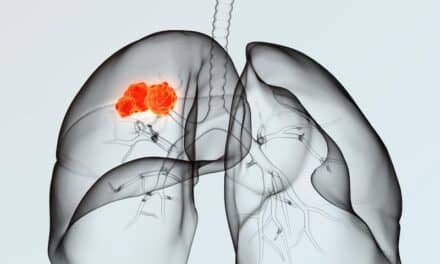ClearNote Health, a cancer detection company focused on enabling people at risk for high-mortality cancers to live healthier lives, announced the publication of new data from a study demonstrating the applications of its epigenomic technology platform in predicting and monitoring immunotherapy responses for patients with non-small cell lung cancer (NSCLC).
The article, “Plasma Cell-Free DNA Hydroxymethylation Profiling Reveals Anti-PD-1 Treatment Response and Resistance Biology in Non-Small Cell Lung Cancer,” was published in the online issue of The Journal for ImmunoTherapy of Cancer, the official journal of the Society for Immunotherapy of Cancer (SITC).
Supporting NSCLC Patients
Immune checkpoint inhibitors have been used to help treat patients with NSCLC, but not all patients respond, and it can be difficult to predict who might benefit from the therapy. In the study, ClearNote Health’s epigenomic platform was used to generate cell free DNA (cfDNA) 5-hydroxymethylation (5hmC) profiles from 151 plasma samples obtained from 31 patients with NSCLC who received programmed death-1 (PD-1) receptor inhibitors, pembrolizumab or nivolumab, as monotherapy. The comparison of plasma-derived cfDNA 5-hmC profiles revealed differences that distinguish patients responding to therapy from those not responding before and throughout treatment.
Additionally, the use of ClearNote Health’s 5hmC technology revealed the same response or resistance biomarkers to PD-1 inhibitors that had previously been identified through gene expression analysis on tumor tissue. This underscores the value of 5hmC analysis for the measurement of treatment response biomarkers without the need for an invasive and potentially deadly tissue biopsy.
Further reading: Liquid Biopsy May Identify NSCLC Patients Who Will Benefit from Radiation
“Immunotherapies, particularly PD-1 inhibitors, have revolutionized cancer treatment, offering new hope to patients. Despite their transformative potential, these therapies are not universally effective, posing a challenge in patient selection. In some cases, treating patients who are unlikely to benefit can waste precious time and expose them to potential side effects,” says Samuel Levy, PhD, chief scientific officer of ClearNote Health. “This underscores the critical need for effective biomarkers that can refine patient selection and monitor responses to therapy to provide the best possible care for patients.”
This NSCLC research builds on ClearNote Health’s prior work in other high-risk cancers, including pancreatic cancer detection and study of prostate cancer biology. A recently published study in Cancer Research, “The 5-Hydroxymethylcytosine Landscape of Prostate Cancer,” showed the utility of ClearNote Health’s platform in marking epigenetic activation in prostate cancer and identifying hallmarks of prostate cancer progression.
Additionally, the company recently entered into a collaboration with Bayer to evaluate biological mechanisms underlying patient response and resistance to treatments for metastatic hormone-sensitive prostate cancer. ClearNote Health’s first commercially available product, the Avantect Pancreatic Cancer Test, was developed to detect the presence of pancreatic cancer signals in patients with previous family history and those recently diagnosed with Type 2 diabetes who are at high risk for the disease.
“Results from this study demonstrate that our novel, tumor naive, non-invasive approach could be pivotal in developing immunotherapy response biomarkers for people with NSCLC,” says Gulfem Guler, senior director and head of Translational Research at ClearNote Health. “For pharmaceutical companies, particularly those involved in PD-1 therapy clinical trials, adopting this approach could help improve trial success by enabling the identification of the right patient groups, potentially accelerating the development of more effective and safer cancer treatments.”





